Career
Alston engaged in agricultural pursuits at his slave plantation, Butterwood Plantation. [2] He was elected to the North Carolina House of Commons in 1790 and served for two years; in 1794 he was elected to a single term in the North Carolina Senate.
In 1798, Alston was elected as a Federalist to the U.S. House, defeating incumbent Thomas Blount and two other candidates. Alston served from March 4, 1799, to March 4, 1815. Early in the Jefferson administration, Alston changed parties and became affiliated with the Republican Party. Local Federalists recruited former Gov. William R. Davie to challenge Alston in 1803, but Alston survived Davie's challenge. Alston chaired the House Committee on Revisal and Unfinished Business during the 13th U.S. Congress. In the election of April 1813, Alston defeated Daniel Mason, the Peace candidate, with the smallest margin of his re-election campaigns (56%-44%), and Alston retired at the end of the term. [3]
He returned to the state House of Commons between 1820 and 1824, and then returned to Washington in 1825, elected as a Jacksonian Democrat. Serving three terms (March 4, 1825 – March 4, 1831), Alston chaired the Committee on Elections during the 21st Congress. He declined to seek re-election in 1830 and returned to agriculture.
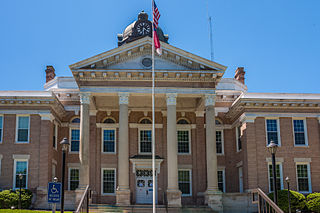
Halifax County is a county located in the U.S. state of North Carolina. As of the 2020 census, the population was 48,622. Its county seat is Halifax.

Littleton is a town in Halifax County, North Carolina, United States. The population was 674 at the 2010 census. It is part of the Roanoke Rapids, North Carolina Micropolitan Statistical Area.

Thomas Newton Jr. was an American politician who was a U.S. Representative from Virginia from 1817 until 1830. Union general John Newton was his son.

John Randolph, commonly known as John Randolph of Roanoke, was an American planter, and a politician from Virginia, serving in the House of Representatives at various times between 1799 and 1833, and the Senate from 1825 to 1827. He was also Minister to Russia under Andrew Jackson in 1830. After serving as President Thomas Jefferson's spokesman in the House, he broke with the president in 1805 as a result of what he saw as the dilution of traditional Jeffersonian principles as well as perceived mistreatment during the impeachment of Samuel Chase, in which Randolph served as chief prosecutor. Following this split, Randolph proclaimed himself the leader of the "Old Republicans" or "Tertium Quids", a wing of the Democratic-Republican Party who wanted to restrict the role of the federal government. Specifically, Randolph promoted the Principles of '98, which said that individual states could judge the constitutionality of central government laws and decrees, and could refuse to enforce laws deemed unconstitutional.
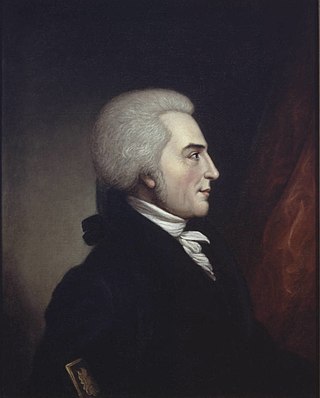
William Richardson Davie was an American statesman, politician, military general, Founding Father of the United States who served as the 10th Governor of North Carolina from 1798 to 1799. A member of the Federalist Party, Davie also served as a delegate to the Constitutional Convention as a representative of North Carolina. He is also one of the key founders of the University of North Carolina.

James Pleasants Jr. was an American politician who served in the U.S. Senate from 1819 to 1822 and was the 22nd Governor of Virginia from 1822 to 1825.
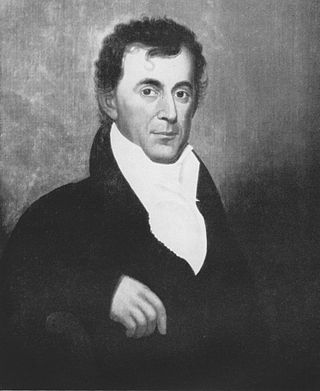
Littleton Waller Tazewell was a Virginia lawyer, plantation owner, and politician who served as U.S. Representative, U.S. Senator and the 26th Governor of Virginia, as well as a member of the Virginia House of Delegates.
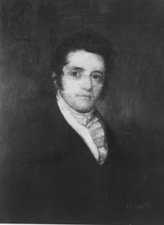
Gabriel Moore was a Democratic-Republican, later Jacksonian and National Republican politician and fifth governor of the U.S. state of Alabama (1829–1831).
George Outlaw was a U.S. Congressman from North Carolina in 1825.

The Era of Good Feelings marked a period in the political history of the United States that reflected a sense of national purpose and a desire for unity among Americans in the aftermath of the War of 1812. The era saw the collapse of the Federalist Party and an end to the bitter partisan disputes between it and the dominant Democratic-Republican Party during the First Party System. President James Monroe strove to downplay partisan affiliation in making his nominations, with the ultimate goal of national unity and eliminating political parties altogether from national politics. The period is so closely associated with Monroe's presidency (1817–1825) and his administrative goals that his name and the era are virtually synonymous.
The tertium quids were various factions of the Jeffersonian Republican Party in the United States from 1804 to 1812.
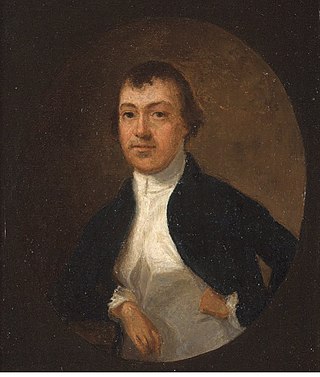
Thomas Mann Randolph Jr. was an American planter, soldier, and politician from Virginia. He served as a member of both houses of the Virginia General Assembly, a representative in the United States Congress, and as the 21st governor of Virginia, from 1819 to 1822. He married Martha Jefferson, the oldest daughter of Thomas Jefferson, the third President of the United States. They had eleven children who survived childhood. As an adult, Randolph developed alcoholism, and he and his wife separated for some time before his death.

The 1824–25 United States House of Representatives elections were held on various dates in various states between July 7, 1824, and August 30, 1825. Each state set its own date for its elections to the House of Representatives before the first session of the 19th United States Congress convened on December 5, 1825. Elections were held for all 213 seats, representing 24 states.
William Fitzhugh Gordon was a nineteenth-century, lawyer, military officer, politician and planter from the piedmont region of Virginia.
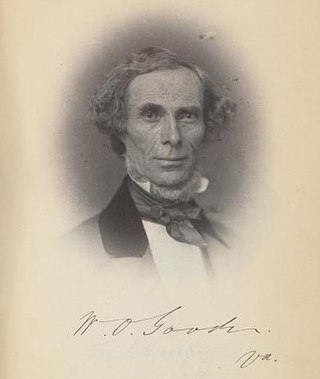
William Osborne Goode was an American politician, slave owner, and lawyer from Virginia.
Mark Alexander was a nineteenth-century lawyer and political figure from Virginia.
William Baylies was an American lawyer and politician who served four non-consecutive terms as a U.S. Representative from Massachusetts in the early to mid-19th century.
Henry Randolph Storrs was a U.S. Representative from New York, brother of William Lucius Storrs.
Thomas Davenport was a U.S. Representative from Virginia.

The 1824–25 United States Senate Elections were held on various dates in various states. As these U.S. Senate elections were prior to the ratification of the Seventeenth Amendment in 1913, senators were chosen by state legislatures. Senators were elected over a wide range of time throughout 1824 and 1825, and a seat may have been filled months late or remained vacant due to legislative deadlock. In these elections, terms were up for the senators in Class 3.
 "Alston, Willis". The Biographical Dictionary of America . Vol. 1. 1906. pp. 97–98.
"Alston, Willis". The Biographical Dictionary of America . Vol. 1. 1906. pp. 97–98.











